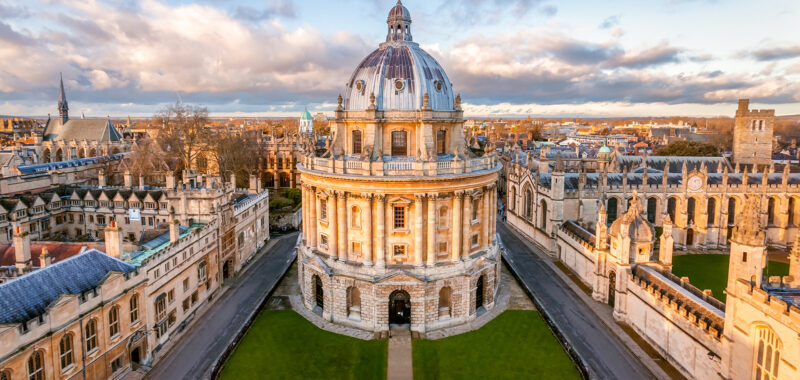Five Harvard College students are among the 32 U.S. Rhodes Scholars for 2025, the most awarded to any institution this year. Three international students in the College also received Rhodes Scholarships, bringing Harvard’s total to eight.
The students will attend Oxford University next year to pursue graduate studies in fields ranging from political theory to neuroscience.
Harvard’s 2025 Rhodes Scholars:
Matthew Anzarouth of Quebec, Canada, was awarded a Rhodes Scholarship for Canada. A social studies concentrator, Anzarouth has conducted research on democratic governance and the effective distribution of development aid through the Weatherhead Center for International Studies, the Tobin Project, and the Center for Effective Aid Policy. He is an editor of the Harvard Political Review and is a member of the Harvard College Debating Union. He hopes to earn a master’s degree in politics at Oxford, studying rights-based liberalism, federalism, and multiculturalism.
Lena R. Ashooh of Shelburne, Vermont, designed a major in animal studies, with research in philosophy, psychology, biology, political science, and other disciplines. She has worked with land law examiners as an intern at the U.S. Bureau of Land Management and has lobbied legislators as an environmental justice intern at the Center on Race, Poverty, and the Environment, a California nonprofit. Ashooh conducted field research on macaque monkeys in Puerto Rico, plays classical harp, and has created a stop-motion animation film about the ethics of eating animals. She plans to study political theory at Oxford.
Shahmir Aziz of Lahore, Pakistan, was named one of two Rhodes Scholars for Pakistan last month. He has conducted research in drug delivery and bio-nanotechnology. Outside the classroom, he is passionate about diplomacy and global governance, serving as a leader of the Harvard International Relations Council and Harvard’s Model UN Team. Aziz plans to continue researching bio-nanotechnology at Oxford while also studying diplomacy with a focus on global health to better understand how to cultivate cross-border ideas in biotech.
Thomas Barone of Little Falls, New Jersey, is a social studies concentrator focused on intellectual history, political rhetoric, and policy. He has interned at the national politics desk of ABC News and serves as editorial chair of The Harvard Crimson, where he won first place for editorial writing in collegiate journalism in the Society of Professional Journalists’ Mark of Excellence Awards. Barone intends to study history at Oxford and plans to pursue a career in journalism.
Sofia L. Corona of Delray Beach, Florida, is studying applied mathematics and economics. She designed her course of study to develop a multidisciplinary perspective on issues in transportation policy, including infrastructure development, clean energy governance, and community decision-making. She worked on federal transportation oversight cases as a legal intern at the U.S. Department of Transportation; researched community participation and renewable energy implementation at the Allen Lab for Democracy Renovation in Harvard Kennedy School’s Ash Center for Democratic Governance and Innovation; and analyzed alternative vehicle upgrades for car models at BMW. She has climbed Aconcagua, Denali, and Mount Kilimanjaro. At Oxford, Corona plans to pursue economics and focus on development, sustainability, and enterprise.
Aneesh Muppidi of Schenectady, New York, is a concentrator in computer science and neuroscience. He has conducted research at the Computational Robotics Lab and the Computational Cognitive Neuroscience Lab, both at Harvard, and MIT’s Fiete Lab, and has been involved in AI policy discussions for New York State and the federal government. Muppidi served as president of the Harvard Computational Neuroscience Undergraduate Society, co-president of the Hindu Students Association, and president of the Harvard Spikeball Club. At Oxford, he will study advanced computer science and public policy.
Ayush Noori of Bellevue, Washington, is studying computer science and neuroscience. His research uses artificial intelligence to comb large-scale biomedical data for diagnosis and treatment options, and he has developed an AI model that can be deployed to predict treatment outcomes in bipolar disorder, Parkinson’s disease, and neuropathic conditions. He has co-authored more than 20 peer-reviewed papers and was awarded the Barry Goldwater Scholarship for natural sciences. Noori is co-founder and co-president of the Harvard Undergraduate OpenBio Laboratory. At Oxford, he hopes to complete degrees in clinical neurosciences and in physiology, anatomy, and genetics.
Laura Wegner of Walsrode, Germany, was one of two recipients of German Rhodes Scholarships. She studies economics and computer science and founded Mii, a digital healthcare passport that empowers patients to manage and access their health records anywhere in the world. At Oxford, Wegner plans to pursue graduate work focused on digital health care technology.
Read more about this year’s Rhodes Scholars at the Rhodes Trust.
Source link

